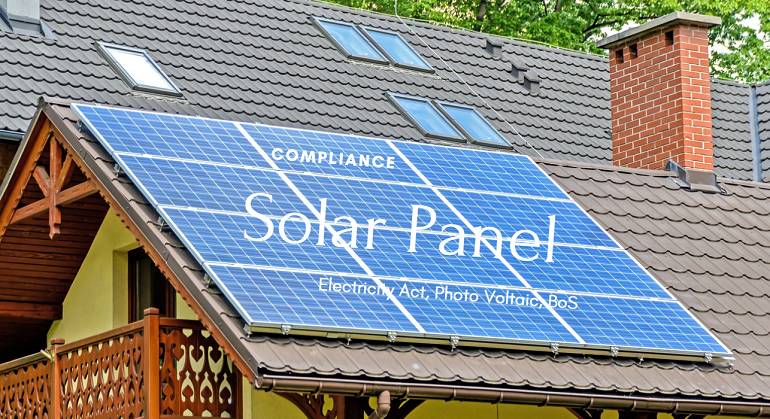

Solar Panel Compliance
The Electricity Act, 2003 has resulted in a paradigm shift in the world of Renewable energy in India. Solar energy is an efficient way of optimum utilization of the assets available in abundance.
India has immense solar-potential and can be used for- Solar Heating or solar electricity with approximately 200-300 sunny days . A power plant generating solar energy is the best viable option for producing electricity in areas where other sources are neither accessible nor extractable.
Authorities/Acts/Rules involved:
- Ministry of New and Renewable Energy. - India is the only country to have a ministry specifically for the purpose of renewable energy development
- Under the Electricity Act, 2003 the main-objective is to advertise and raise competition in the renewable energy resource in Industry in India as per the new guidelines.
- The Jawaharlal Nehru National Solar Mission is a paramount measure by the Govt. of India which requires dynamic co-operation from the States to encourage a balanced/sustainable development
- With active participation from States to promote ecologically sustainable growth while addressing India’s energy security challenge. A major contribution towards the worldwide endeavor towards facing the Irreparable damage to Climate.
Solar Compliances
A. Identification and Testibility:
- According to India’s National Solar Mission it is obligatory for every Photovoltaic(PV) module used in Solar Power Project to use a Radio Frequency Identification (RFID) tag including producer origin and technical data in accordance to the Ministry of New and Renewable Energy standards.
- Thus in accordance to the MNRE, each Photovoltaic(PV) module must store the below- mentioned details in the table:
| Sr. No. | Details |
| 1. | Name of the manufacturer of the PV Module |
| 2. | Name of the manufacturer of Solar-cells |
| 3. | Month and year of the manufacture (separately for solar cells and module) |
| 4. | Nation of origin (Separately for solar cells and module) |
| 5. | I-V curve for the module 6. Peak Wattage, Im, Vm and FF for the module |
| 6. | Peak Wattage, Im, Vm and FF for the module |
| 7. | Unique Serial No and Model No of the module |
| 8. | Date and year of procuring IEC-PV module qualification certificate |
| 9. | Name of the test lab issuing IEC certificate |
| 10. | Other relevant information on traceability of solar cells and module as per ISO 9000 series |
Post April1, 2013 the Radio Frequency Identification (RFID) needs to be placed inside the module laminate.
B. Authorization of Testing Centers and Labs
- PV modules need to meet the required IEC (International Electrotechnical Commission ) standard i.e. enclosing test-reports or certificates through IEC or National Accreditation Board for Testing and Calibration Laboratories(NABL) officially recognized laboratory.
- Upto the capacity of 50Wp : Testing and Approval of PV module functioning at the standard testing conditions(STC) by labs authorized via IEC/NABL.
- For capacity above 50 Wp : Regular module need be complemented with the STC report or certificate.
C. Application for Testing by the Manufacturer
| Sr. No. | Compliance Name | Description |
| 1. | Registration copy | of the company specifically for the concerned product/element/PV system which is to be examined. |
| 2. | Adequate Proof | proof is required which shows the manufacturing of the product via production, testing etc. |
| 3. | Certification | as per the Jawaharlal Nehru National Solar Mission (JNNSM) standards. |
D. Warranty by the Manufacturer
Warranty must be provided for the Photovoltaic modules in Solar power systems for their output-peak-watt capacity, on the following conditions:
- At the end of 10 years not less than 90.
- At the end of 25 years not less 80%.
E. For Balance of System(BOS) Items/Components of SPV
- Must be In conformation with the latest IEC/ BIS/ MNRE guidelines.
- Authorization of BOS items/components
- test certificate/report can be from any of NABL/IEC authorised labs or MNRE
- approved test facilities. -the list of such facilities is assessed and amended timely
- The following elements need to be warranted against any manufacturing/design/installation defects for a minimum period of 5 years-
- mechanical structures
- electrical works
- power conditioners
- inverters
- charge controllers etc.
- workmanship OS solar Photovoltaic module power plants



